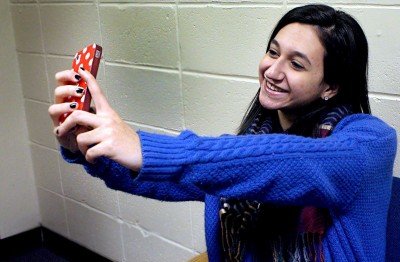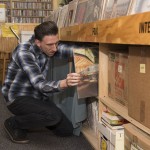
With the growth of technology and social media, “selfies” remain part of the cultural landscape, according to a report released Thursday by communications agency Coyne PR.
Titled “State of the Selfie,” the report examined the culture of selfies, or pictures that people take of themselves, including why people are interested in them, what purpose they serve and how people can use selfies to express themselves.
“We wanted to explore not only how selfies are used today, but how they may be used in the future,” wrote Marie Baker, digital account manager at Coyne PR, in an email. “It’s still a popular type of content and still relevant for society and culture to pay attention to. Within the report, we also looked at how selfies have penetrated culture from university courses to inventions — the selfies are definitely not going away any time soon!”
Baker said people take selfies for the same reason they would take traditional photographs — to capture memories.
“At the end of the day, people will have their personal opinions,” she said. “There’s a drastic difference between showing off a new haircut and then risking your life on the side of a mountain for the perfect shot. Social media gives so many people a channel to express themselves for the good and the bad.”
Approximately 85 percent of survey responders said they post a selfie once a week on social media sites such as Facebook and Instagram.
Elizabeth Crocker, a graduate research assistant at Boston University, said selfies are not a new phenomenon.
“The earliest cave paintings we saw were hand prints, and it was the basic way they could record themselves being there,” she said. “We are fascinated by faces, our expressions and emotions, the way we communicate [and] a lot of it is through our faces. Artists have been painting themselves for eons. Early photography allowed us to do that.”
Crocker said she works with James Katz, the director of the division of emerging media studies in the College of Communication, on research involving selfies.
Crocker said new technology has allowed more people to express themselves.
“It has come really democratized,” she said. “It’s so easy everyone can do it, and if you screw up, you can just delete it. Everyone can take selfies. It’s no longer something you need to be an artist to capture the self portrait or someone who has an expensive camera … People haven’t changed, just the technology and the ability to do it.”
The survey found that 82 percent of responders take selfies because they want to show off something new, such as clothing or a hairstyle.
Baker said Snapchat has gotten the younger demographic more engaged and allows for a more controlled, yet creative platform to share selfies.
“Snapchat lets you video all the angles of your selfie, so it provides a different experience,” she said. “While all channels let you have control over where your selfie goes (privacy settings, etc.), Snapchat gives users a more intimate — or “secure” — channel to send out their content, which is why you’ll continue to see an increase on that channel as well.”
The study also includes some of the arguments for and against selfies, including what kind of impact they have on self esteem.
Several students said they take selfies as a way to communicate with friends.
Alyssa Marion, a first-year graduate student in COM, said she takes selfies to communicate emotions with her friends.
“I take selfies not really just as a joke, but to send them to my friends,” she said. “If I have to go to practice and I’m not in the mood, I’ll take an ugly selfie and send it to my teammate.”
Lauren Catena, a freshman in the College of General Studies, said selfies provide an easy, quick solution to taking a photo.
“Selfies are a fun and easier way to take a picture, especially if you can’t find someone to take a picture of you,” she said. “I always associate my selfies with Snapchat because it’s the quickest. You take a picture, and you send it immediately. If I take a selfie, it’s on Snapchat.”
Jacob Cohen, a freshman in the College of Fine Arts, said selfies are a fun way to keep friends updated on what he’s doing.
“People in today’s day and age like to keep people updated with what they are doing,” he said. “Half of it is a fun thing, and half of it is a ‘Hey look at me and what I’m doing’ kind of thing.”




